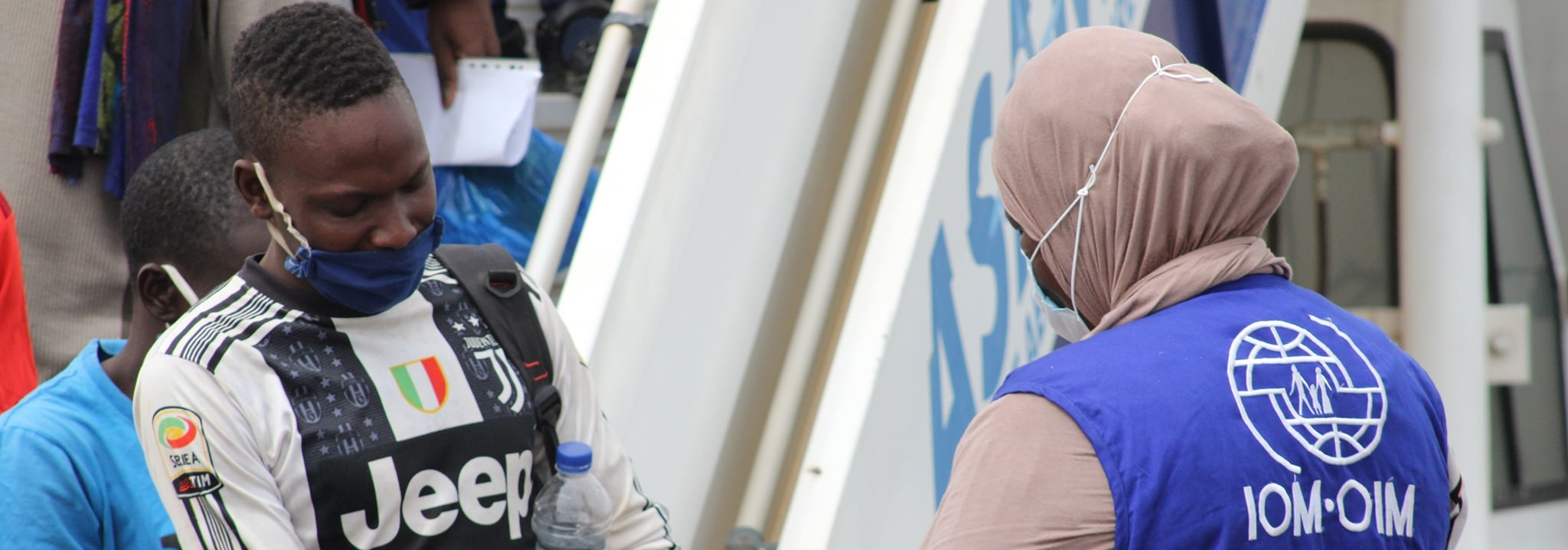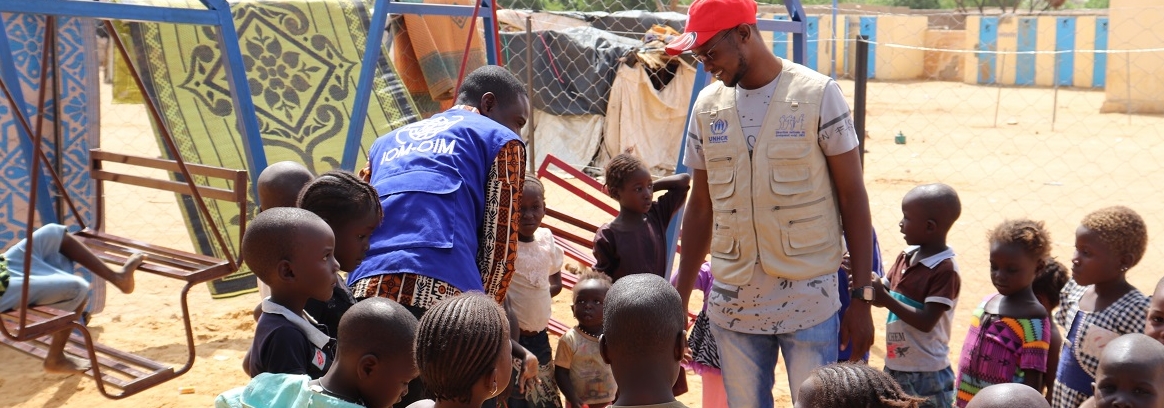IOM Vision
IOM Mali, in partnership with key stakeholders, including governmental, non-governmental organizations and United Nations agencies, continues to provide humanitarian assistance to internally displaced persons (IDPs) and affected communities while working to address the drivers of the conflict, in alignment with the strong commitment to operationalize the triple Nexus in the region. In 2022, IOM Mali will continue to provide frontline multi-sectoral humanitarian assistance in locations where needs are high. IOM’s priority is to expand programming that tackles the pre-existing drivers of fragility and conflict while laying the foundations for stability and development.
Objective
Saving lives and protecting people on the move
IOM Mali will identify and respond to the humanitarian needs of displaced and conflict-affected populations in the central and northern parts of the country through multi-sectoral assistance in kind and cash to address their vital and survival needs. Particular attention will be paid to vulnerable groups and persons with specific needs such as youth, women, elderly persons, people with disabilities or chronic illnesses, and will ensure equitable access to all groups of people, considering their vulnerabilities. IOM staff and implementing partners receive training on prevention of sexual exploitation and abuse (PSEA), on how to respond ethically to the disclosures of sexual and gender-based violence.
As the shelter and NFI cluster co-lead in Mali, IOM will continue to provide tailored shelter/NFI assistance to the most vulnerable IDPs to address their urgent needs. In parallel, the Organization will also deliver support to improve access to basic infrastructure and services for host communities. IOM will specifically focus shelter assistance on Mopti and Segou as regions that host around 50 per cent of Mali’s IDPs. IOM Mali will dedicate its work to:
- Maintain a flexible package of in-kind, cash or mixed shelter assistance (for instance provision of NFIs kits; cash for rent; emergency and transitional shelter kits) to be deployed in line with the shelter/NFI cluster guidelines and the Sphere manual, taking into account inclusive distribution techniques based on vulnerability scoring criteria as well as cross-cutting protection principles, including GBV risk mitigation and PSEA standards;
- Select IDPs and host communities as targeted populations through transparent processes adapted to the local context and relevant vulnerability criteria, and further strengthen capacities in these areas while continuing its coordination with relevant authorities and local communities;
- Provide transitional shelter and local infrastructure projects to assist returnees when the situation improves and conditions for voluntary return are met. In addition, they will contribute to disaster risk reduction in terms of flood prevention/management.
Shelter/NFI materials will be purchased directly by the organisation. Wherever possible, local materials will be sourced. If local procurement is not possible, or if it would compromise the quality of the aid, international procurement will be considered. IOM is the procurement partner and provides transport of materials to the partners' warehouses in the field. Cluster partners can also be storage and transport partners (providing storage and transport from warehouse to intervention site), and/or distribution partners. Activities will be implemented in coordination with the shelter/NFI cluster and the Malian authorities in charge of assistance to displaced people.
|
In view of the precarious health situation in Mali, which is becoming ever more fragile with the persistence of the COVID-19 pandemic and its profound impact on the public health system, IOM Mali will continue to support public health authorities through facilitating enhanced direct health service provision and provision of medicines, health emergency planning, training and monitoring, including programming at points of entry (PoE) in line with the International Health Regulations (IHR 2005). IOM Mali’s actions will include:
|
|
In order to ensure that protection risks to which affected populations are exposed to are reduced, IOM will conduct protection interventions and integrate protection mainstreaming principles across its crisis programming including through:
|
|
Following IOM’s Manual on Community-Based Mental Health and Psychosocial Support in Emergencies and Displacement, IOM will establish psychosocial mobile teams (PMTs), composed of e.g. psychologists and social workers. These teams will identify, attend, counsel, orient, directly assist individuals in need of short-term support, while those in need of longer-term assistance will be referred to the larger health structures for specialized mental health services. Initiatives will include:
|

Objective
Driving solutions to displacement
IOM in Mali seeks to address the root causes and impact of displacement in order to prevent further crises and allow for recovery, with a focus on displacement affected populations in the centre and northern parts of Mali. To strengthen social cohesion, IOM's approach targets local communities, including authorities, women and youth, as well as IDPs, host communities and returnees using a gender and conflict-sensitive lens. To select target locations, IOM will identify the types of conflicts encountered at each potential intervention site, to establish the lines of conflict (functional links), understand their evolution and frequency, and thus prioritize target locations based on instability but also existing prevention and management mechanisms and their degree of effectiveness.
|
In 2022, IOM Mali will undertake activities in the regions of Gao, Kayes, Mopti, Segou and Tombouctou to foster social cohesion, to promote peaceful interactions between displaced and host communities as well as returnees and communities of origins. IOM support will also contribute to addressing the drivers of conflicts that are impeding peaceful coexistence and promote peaceful resolution of conflicts. Specifically, IOM will undertake the following activities:
|
|
Through its community stabilization approach and considering the ongoing conflict and multifaceted insecurities affecting population in crises areas, IOM will pursue work dedicated to community recovery by strengthening coping capacities, fostering self-reliance and creating environments conducive to resolving displacement. In 2022, IOM initiatives in Mali will include:
|
|
IOM will continue to support community recovery and resilience-building as a prerequisite to the sustainable voluntary return of displaced populations to their places of origin or local integration in the places of displacement. In accordance with IOM's Progressive Resolution of Displacement Situations Framework, initiatives addressing the factors that lead to displacement will include:
|
Objective
Strengthen preparedness and reduce disaster risk
IOM Mali will support communities affected by disasters caused by natural hazards, such as droughts and floods, which occur regularly in Mali, and build the capacities of governmental partners to address the impact of disasters on the population’s livelihoods which are heightened by the high level of poverty weakening people’s capacity to absorb shocks, and exacerbated by structural vulnerability to disasters and climate change due to rising temperatures, land degradation, desertification and water scarcity. IOM will specifically target those in displacement or otherwise impacted by disaster and support the government to better understand the linkages between climate change impact and migration, supporting the prevention of disasters and reducing risks linked to natural hazards.
|
With regards to disaster prevention and the reduction of climate change impacts, IOM Mali will focus on strengthening the anticipatory and adaptive capacities of communities to climate risks. In parallel, IOM will work to address structural causes of displacement such as the depletion of natural resources and economic opportunities in rural areas by advising government and local authorities on the integration of environmental factors into policies and implementing measures. In 2022, initiatives will include:
|
Objective
Contribute to an evidence-based and efficient crisis response system
IOM will seek to improve evidence-based interventions and policies in Mali by providing governmental, non-governmental and humanitarian actors in Mali, with data and analysis linked to population displacements, human and animal mobility (such as migration and transhumance). The support will target actors not only at national level but also at local level, for instance by involving and training state agents of decentralized authorities and representatives of local civil society organizations. IOM will therefore contribute to informing better decision-making and management of displacements and mobility, including transhumance management and infrastructure.
|
Through continuous monitoring of displacement and analysis of the needs of vulnerable populations to inform the humanitarian community via the implementation of the Displacement Tracking Matrix (DTM), IOM and its implementing partners will ensure that targeted assistance is provided to IDPs based on identified needs. In order to complement transition and recovery activities, IOM Mali will implement the stability index, a tool deployed by IOM’s DTM in support of post-crisis recovery phases. In 2022, IOM will:
|
Mali
The map used here is for illustration purposes only. Names and boundaries do not imply official endorsement or acceptance by IOM.
Figures are as of 31 December 2023. For more details of IOM's operational capacity in country, please see the IOM Capacity section.













